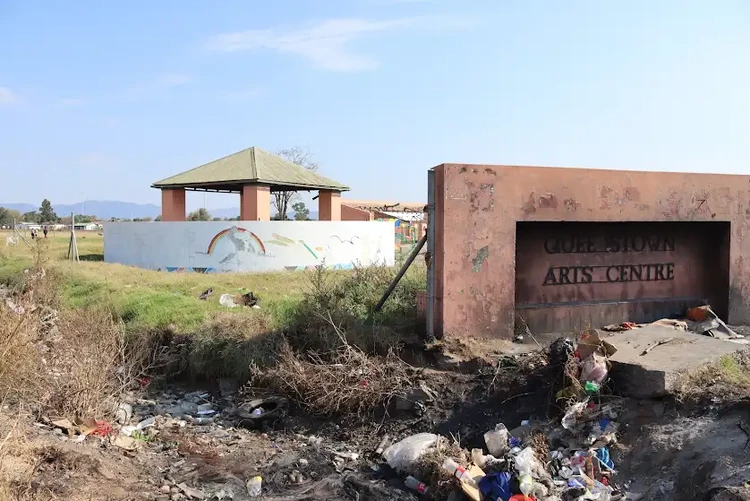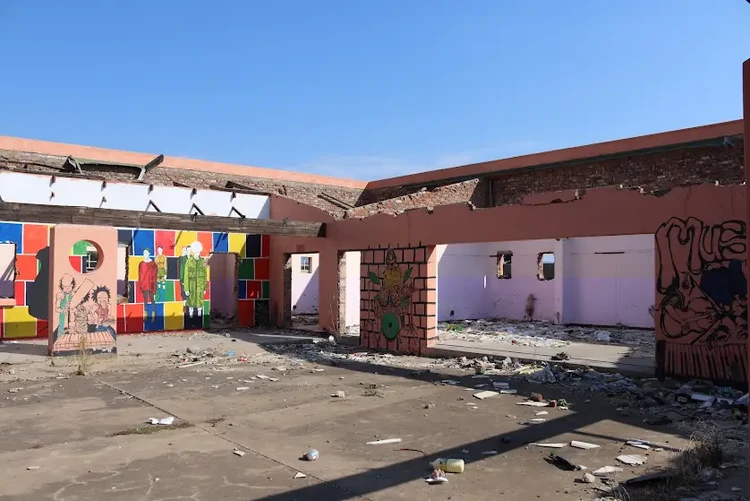Musicians in “Little Jazz Town” want Gayton McKenzie to fix their broken arts centre
Komani jazz legend Mlungisi Gegana blames the Eastern Cape arts department for the collapse of the centre
The Queenstown Art Centre has fallen into ruin. Photos: Manqulo Nyakombi
- The Queenstown Art Centre in Komani in the Eastern Cape has not been used since the start of the Covid pandemic.
- It has been vandalised and is in ruins.
- The Eastern Cape department of arts and culture says there was a problem with the sewer system.
- But artists who used the centre blame the department for failing to manage it or not allowing others to do so.
Musicians in Komani in the Eastern Cape say they will write to new Minister of Arts and Culture Gayton McKenzie asking for help to fix the Queenstown Art Centre. It has been stripped bare by vandals, leaving musicians in “Little Jazz Town” with nowhere to teach or practise. They blame the Eastern Cape department of arts and culture for neglecting the building.
The centre no longer has doors or windows or a fence. All that is left is a building with no roof, except for a bit of roof over a small stage at the entrance. The equipment inside has been stolen.
Spokesperson for the Eastern Cape Department of Sport, Recreation, Arts and Culture Sivuyile Ngaba said the centre was closed in 2020, during the Covid lockdown. He said a private security company and a security guard were contracted to guard the centre, but this was discontinued because of problems with electricity and the sewer system which “posed a health hazard”.
The art centre then remained closed after the Covid restrictions were lifted because of the sewer problem.
But asked about a sewer problem, Chris Hani District Municipality spokesperson Bulelwa Ganyaza said they had no record of a complaint affecting the arts centre.
Ngaba said the department was exploring options for the centre with the municipality. Options included redirecting the sewer drainage system or identifying land to build a new centre.
Artists say they offered to manage the centre themselves, but the department did not allow it.
The art centre, which opened in 1998, was used by jazz musicians to practise and to teach, and also by fashion designers and visual artists.
Those who were using the centre said they begged the department several times to let them manage the place but to no avail.
Jazz musician Mlungisi Gegana said he returned to Komani in 2018 to start the Mlungisi Music Academy, teaching music to young people. Before the centre closed in 2020, he used to hold classes there, teaching more than 100 people, he said.
“When I came here, I only had one dream, which was to plant what I have learned in the music industry as a jazz artist in the past 30 years. I travelled the world, I rubbed shoulders with big artists like Stompie Mavi, Margaret Mcinganga, Mongezi Veza, just to name a few. Because I know Komani has talent, I knew that starting the academy would help a lot of young people who want to be in the music industry,” said Gegana.
Gegana said that after the Covid restrictions were lifted, he and other artists went to the department to ask for the centre to be opened again. At the time the building was still in good condition. But there were no guards looking after it.
“The sad part about this is that the vandalism didn’t occur in one day. It could have been avoided, if they had allowed us to use it again,” he said.
Another musician, Khanyiso Twala, said the centre had not been well managed from the start. He said the sewer issue was minor and could have been fixed in no time.
“The department, as the managers of the centre, failed to look after it,” he said. “Clearly they lack vision and it’s a pity that it is us artists who suffer.”
Gegana said the department was exaggerating the sewer issue. He said even before lockdown there had been problems with the women’s toilets but everyone had shared the four men’s toilets.
“We were working just fine until the centre was closed in 2020 during the pandemic,” he said
Komani Progress Action secretary Axolile Masiza also said that before the centre was vandalised they had gone to the department’s offices to ask for it to be opened.
“When we got there we were told a long story about procedures which some of us didn’t understand,” said Masiza.
“I don’t think the sewer could prevent the guards from looking after the building. It’s clear they are just covering up for each other or they don’t want to accept that they have failed.
“If you go around this town there’s a number of skeleton buildings, some got burnt, others were just left to be vandalised, and the sad thing is that there’s no accountability.
“In years to come, they will be talking about millions to be spent fixing what they neglected, and there’s nothing we can do about that,” said Masiza.
“We can’t keep losing buildings to vandals because someone is failing to do his or her job.”
Masiza and Gegana said they would write to Mckenzie to ask him to intervene.
Support independent journalism
Donate using Payfast

Don't miss out on the latest news
We respect your privacy, and promise we won't spam you.
Next: Judge Makhubele is not fit to be a judge, says #UniteBehind
Previous: Khayelitsha women want to start a clothing factory
© 2024 GroundUp. This article is licensed under a Creative Commons Attribution-NoDerivatives 4.0 International License.
You may republish this article, so long as you credit the authors and GroundUp, and do not change the text. Please include a link back to the original article.
We put an invisible pixel in the article so that we can count traffic to republishers. All analytics tools are solely on our servers. We do not give our logs to any third party. Logs are deleted after two weeks. We do not use any IP address identifying information except to count regional traffic. We are solely interested in counting hits, not tracking users. If you republish, please do not delete the invisible pixel.


